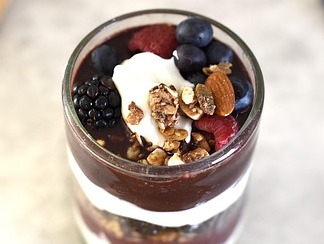Following on from my article on Overcoming Sugar Addiction I thought this excellent article and research findings from Trudy Scott (CN) would be of interest. As well as anxiety I have found that a diet high in processed Carbs and high glycemic foods that lead to low blood sugar episodes also cause inflammation in other tissues and can be a contributing factor to many conditions.
One of the most helpful additions to your diet when transitioning to a healthier way of eating is a breakfast that includes protein, fat and fiber. I like to make it easy for people that are not used to eating a healthy breakfast by preparing a highly nutritious smoothie the night before and popping it in the fridge. Here is one of my favourite recipes – I like it thick so that I eat it with a spoon and it does thicken slightly overnight so adjust milk accordingly. You can also vary it by adding cinnamon when you don’t have berries or use frozen fruit.
Choco-loco Breakfast Smoothie
Into a blender pop
100-150 ml non-dairy milk like coconut or almond milk
a handful of berries, peeled and chopped pear or small slightly unripe banana
1 scoop of whey free vanilla Protein Powder (or natural plus some vanilla essence)
2 tsp. Almond Butter
1 tsp. Coconut oil or MCT oil
1 Tbsp. Cocoa powder
1 tsp. Maple Syrup or honey
50g gluten free oats
Empty the contents of one Probiotic capsule and blitz until smooth. Cover and pop into the fridge overnight and then in the morning all you have to do is top with a few more berries and nuts for texture – almond flakes, pecans and walnuts all go well with chocolate. Enjoy.
Article from Trudy Scott CN
A paper published by the Canadian College of Naturopathic Medicine last month supports what I see with my clients on a daily basis: when it comes to anxiety caused by low blood sugar (or hypoglycemia) the correct diet can have a huge impact. And this means is the inclusion of enough protein, fats and fiber, especially at breakfast.
Here is the abstract from the paper: Generalized Anxiety Disorder and Hypoglycemia Symptoms Improved with Diet Modification
Observational evidence suggests that a relationship may exist between high glycemic index diets and the development of anxiety and depression symptoms; however, as no interventional studies assessing this relationship in a psychiatric population have been completed, the possibility of a causal link is unclear.
AB is a 15-year-old female who presented with concerns of generalized anxiety disorder and hypoglycemia symptoms. Her diet consisted primarily of refined carbohydrates. The addition of protein, fat, and fiber to her diet resulted in a substantial decrease in anxiety symptoms as well as a decrease in the frequency and severity of hypoglycemia symptoms.
A brief return to her previous diet caused a return of her anxiety symptoms, followed by improvement when she restarted the prescribed diet.
This case strengthens the hypothesis that dietary glycemic index may play a role in the pathogenesis or progression of mental illnesses such as generalized anxiety disorder and subsequently that dietary modification as a therapeutic intervention in the treatment of mental illness warrants further study.
Here are some details about this case report for AB, who was a 15-year-old female student of south-Asian descent:
